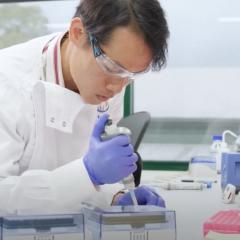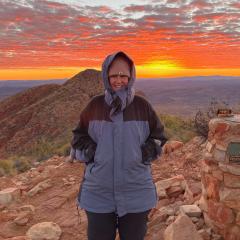The prospect of increasing the accuracy of early ovarian cancer detection from 50 per cent to 90 per cent has brought welcome financial support for a University of Queensland research team.
UQ Centre for Clinical Research (UQCCR) Associate Professor Carlos Salomon Gallo, raised on the edge of Chile’s Atacama Desert in a house with three generations of women, is leading the project.
“We’ve had extremely encouraging results so far in tests validated with 500 women. The capacity of our method to identify positive cases was greater than 90 per cent, suggesting it could be an ideal first-line test for population screening,” Dr Salomon Gallo said.
“Our research aims to achieve rapid identification of ovarian cancer in the first and second stages of formation, which is where the current gaps in community detection are evident.
“I’m extremely pleased our progress was recognised with a $2.7 million grant from the Australian Government in the most recent Medical Research Future Fund (MRFF) allocations, which will be used to validate our method in a large cohort of patients and, in due course, clinical implementation.
“This is a great team effort across more than eight years of research. Last year our research program received $1.5 million from the National Health and Medical Research Council (NHMRC), plus $1.2 million from the previous MRFF round. It’s incredibly heartening to have the backing of the nation.”
The UQCCR team’s main weapon is a test that targets tiny bubbles produced by cells – exosomes.
In a nod to the support Australia has given him since he arrived in 2013 as a postdoctoral researcher, Dr Salomon Gallo named the algorithm behind his project ‘OCRF-7’. The name refers to the Ovarian Cancer Research Foundation (OCRF), who believed in his early work.
“In 2019 in Australia there were 1510 diagnosed cases of ovarian cancer and 1046 deaths, with the major contributing factor to the high mortality rate being late detection,” Dr Salomon Gallo said.
“The key in enabling organisations such as OCRF to make a difference is sustained funding.
“To attract the best global researchers, and to divert energies to the most promising projects, which deliver the biggest impact for the largest number of people, you have to think long-term.”
Dr Salomon Gallo and fellow chief investigators from UQ, Professor Gregory Rice and Professor Sunil Lakhani, will use their latest round of funding to increase the scale and consistency of their testing.
The next steps include collaborating with Professor Usha Menon of University College London to test the algorithm in conjunction with data from the world’s largest ovarian cancer screening trial.
“We will have access to samples taken between one and five years before the diagnosis of ovarian cancer, and will determine how early our test can indentify these women,” Dr Salomon Gallo said.
The project also involves experts from National University Hospital, Singapore, and Australian National University.
Associate investigators from UQ are Dr Andrew Lai, Professor John Hooper, Professor Lewis Perrin, Associate Professor Jim Coward, Dr Shayna Sharma, and Dr Priyakshi Kalita-de-Croft.
Additionally, Dr Salomon Gallo has thanked the Lion Medical Research Foundation and the Donald and Joan Wilson Foundation for their continued support of his research.
Media: Associate Professor Carlos Salomon Gallo, csalomongallo@uq.edu.au, +61 416 310 695; UQ Communications, med.media@uq.edu.au , +61 7 3365 5118, +61 448 410 364.



